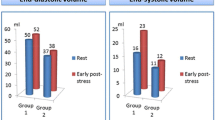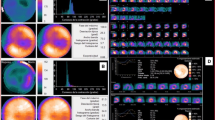Abstract
Background
Elevated transient ischemic dilatation (TID) ratio during myocardial perfusion imaging (MPI) is described as a marker of severe CAD, even in acquisitions with normal perfusion. This was initiated to explore the effects of stressor type on the TID. Additionally the relation between the TID and other functional parameters, such as end diastolic volume (EDV), end systolic volume (ESV), and left ventricle ejection fraction (LVEF), heart rate (HR), and severity of ischemia, was evaluated.
Method
A total of 299 consecutive patients referred for a 2-day stress/rest MPI protocol were included. Patients were stressed with either adenosine (n = 164) or exercise (n = 135). MPI data were analyzed with an automated software tool to determine TID, EDV, ESV, LVEF, SSS, and SDS. The SDS was used to quantify the degree of ischemia, with a SDS ≥ 3 considered ischemic.
Results
Comparison of the adenosine and exercise stressed population revealed significant differences, especially in parameters derived from the poststress acquisition. Within the exercise stressed population, TID was proportional with the SDS (R 2 = .12); whereas the adenosine population did not show such a relation (R 2 = .001). Difference in HR between rest and poststress acquisitions showed high levels of linear regression with TID values of both the adenosine (R 2 = .41) and exercise (R 2 = .29) stressed population.
Conclusion
In an exercise stressed population, TID is determined by both the degree of ischemia and the heart-rate difference between the two acquisition moments. TID within the adenosine population was found to be highly proportional with the HR, rather than with the degree of ischemia.



Similar content being viewed by others
References
Abidov A, Germano G, Hachamovitch R, Berman DS. Gated SPECT in assessment of regional and global left ventricular function: Major tool of modern nuclear imaging. J Nucl Cardiol 2006;13(2):261-79.
Gimelli A, Rossi G, Landi P, et al. Stress/rest myocardial perfusion abnormalities by gated SPECT: Still the best predictor of cardiac events in stable ischemic heart disease. J Nucl Med 2009;50(4):546-53.
Hansen CL, Goldstein RA, Akinboboye OO, et al. Myocardial perfusion and function: Single photon emission computed tomography. J Nucl Cardiol 2007;14(6):e39-60.
Slutsky R, Karliner J, Ricci D, et al. Response of left ventricular volume to exercise in man assessed by radionuclide equilibrium angiography. Circulation 1979;60(3):565-71.
Stolzenberg J. Dilatation of left ventricular cavity on stress thallium scan as an indicator of ischemic disease. Clin Nucl Med 1980;5(7):289-91.
Mazzanti M, Germano G, Kiat H, et al. Identification of severe and extensive coronary artery disease by automatic measurement of transient ischemic dilation of the left ventricle in dual-isotope myocardial perfusion SPECT. J Am Coll Cardiol 1996;27(7):1612-20.
McClellan JR, Travin MI, Herman SD, et al. Prognostic importance of scintigraphic left ventricular cavity dilation during intravenous dipyridamole technetium-99m sestamibi myocardial tomographic imaging in predicting coronary events. Am J Cardiol 1997;79(5):600-5.
Duarte PS, Smanio PE, Oliveira CA, Martins LR, Mastrocolla LE, Pereira JC. Clinical significance of transient left ventricular dilation assessed during myocardial Tc-99m sestamibi scintigraphy. Arq Bras Cardiol 2003;81(5):474-82.
Abidov A, Bax JJ, Hayes SW, et al. Transient ischemic dilation ratio of the left ventricle is a significant predictor of future cardiac events in patients with otherwise normal myocardial perfusion SPECT. J Am Coll Cardiol 2003;42(10):1818-25.
Abidov A, Bax JJ, Hayes SW, et al. Integration of automatically measured transient ischemic dilation ratio into interpretation of adenosine stress myocardial perfusion SPECT for detection of severe and extensive CAD. J Nucl Med 2004;45(12):1999-2007.
Bestetti A, Di LC, Alessi A, Triulzi A, Tagliabue L, Tarolo GL. Post-stress end-systolic left ventricular dilation: A marker of endocardial post-ischemic stunning. Nucl Med Commun 2001;22(6):685-93.
Weiss AT, Berman DS, Lew AS, et al. Transient ischemic dilation of the left ventricle on stress thallium-201 scintigraphy: A marker of severe and extensive coronary artery disease. J Am Coll Cardiol 1987;9(4):752-9.
Rivero A, Santana C, Folks RD, et al. Attenuation correction reveals gender-related differences in the normal values of transient ischemic dilation index in rest-exercise stress sestamibi myocardial perfusion imaging. J Nucl Cardiol 2006;13(3):338-44.
Ficaro EP, Lee BC, Kritzman JN, Corbett JR. Corridor4DM: The Michigan method for quantitative nuclear cardiology. J Nucl Cardiol 2007;14(4):455-65.
Hsu CC, Chen YW, Hao CL, et al. Comparison of automated 4D-MSPECT and visual analysis for evaluating myocardial perfusion in coronary artery disease. Kaohsiung J Med Sci 2008;24(9):445-52.
Abidov A, Germano G, Berman DS. Transient ischemic dilation ratio: A universal high-risk diagnostic marker in myocardial perfusion imaging. J Nucl Cardiol 2007;14(4):497-500.
Kirkpatrick ID, Leslie WD. Erroneous Left ventricular cavity size measurements on myocardial perfusion SPECT resulting from transient arrhythmias. Clin Nucl Med 2005;30(12):783-6.
Choong KK, Russell PA. Transient left ventricular dilatation in the absence of epicardial disease on angiography. Clin Nucl Med 2004;29(6):348-51.
Hardebeck CJ. Transient ischemic dilation. J Am Coll Cardiol 2004;44(1):211-2.
Robinson VJ, Corley JH, Marks DS, et al. Causes of transient dilatation of the left ventricle during myocardial perfusion imaging. AJR Am J Roentgenol 2000;174(5):1349-52.
Leslie WD, Levin DP, Demeter SJ. Variation in heart rate influences the assessment of transient ischemic dilation in myocardial perfusion scintigraphy. BMC Nucl Med 2007;7:1.
Spaan J, Kolyva C, van den WJ, et al. Coronary structure and perfusion in health and disease. Philos Transact A Math Phys Eng Sci 2008;366(1878):3137-53.
Iskandrian AE, Heo J. Myocardial perfusion imaging during adenosine-induced coronary hyperemia. Am J Cardiol 1997;79(12A):20-4.
McGuinness ME, Talbert RL. Pharmacologic stress testing: Experience with dipyridamole, adenosine, and dobutamine. Am J Hosp Pharm 1994;51(3):328-46.
Duncker DJ, Bache RJ. Regulation of coronary blood flow during exercise. Physiol Rev 2008;88(3):1009-86.
Author information
Authors and Affiliations
Corresponding author
Additional information
B. J. van der Veen and N. Kuperij contributed equally.
Rights and permissions
About this article
Cite this article
van der Veen, B.J., Kuperij, N. & Stokkel, M.P.M. Transient ischemic dilatation ratio derived from myocardial perfusion scintigraphy: What are we looking at?. J. Nucl. Cardiol. 17, 207–215 (2010). https://doi.org/10.1007/s12350-009-9180-z
Received:
Accepted:
Published:
Issue Date:
DOI: https://doi.org/10.1007/s12350-009-9180-z




